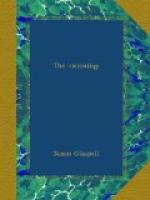Or rather, had the world in which Ann lived cared to know real things for precious things, the desire for life as the most radiant thing that had ever been upon the earth. Ann would have found the world a different place had men known life for the majestic thing it was, seen that back of what her uncle called the “splendid heritage of the country’s institutions” was the vastly more splendid heritage of the institution of life. Letting the former shut them from the latter was being too busy with the toy lake to look out at the sea.
Seeing Ann as part of all the life that had ever been upon the earth she became, not infinitesimal, but newly significant. Widened outlook brought deepened feeling. Newly understanding, she sat there brooding over Ann anew, pain in the perfection of her understanding.
But new courage. Life had persisted through so much, was so triumphant. The larger conception lent its glow to the paling belief that Ann would persist, triumph.
“Aunt Kate,” Worth burst forth, “let’s take the boat and go up and find the man that mends the boats.”
Aunt Kate blushed. “Oh no, dearie, we couldn’t do that.”
“Why we did do it once,” argued Worth.
“I know, but we can’t do it now.”
“I don’t see why not.”
No, Worth didn’t see.
“I just want to ask him, Aunt Kate, if he knows that he used to live in a tree.”
“Oh, he knows it,” she laughed.
“He knows everything,” said Worth.
“Worthie, is that why you like him? ’Cause he knows everything? Or do you like him—just because you like him?”
“I like him because he knows everything—but mostly I like him just because I like him.”
“Same here,” breathed Aunt Kate.
The man who mended the boats was coming to see her that night. Perhaps golf and evolution should not grow arrogant, after all.
He had been strange about coming; when she talked with him over the ’phone he had hesitated at the suggestion and finally said, with a defiance she could not see the situation called for, that he would like to come. In Chicago he had once said to her: “There’s too much gloom around you now for me to contribute the story of my life. But please remember that that was why I didn’t tell it.”
She wondered if the “story of his life” had anything to do with his hesitancy in coming to see her. Surely he would have no commonplace notions about “different spheres,” though he had mentioned them, and with bitterness. He was especially hostile to the army, had more than once hurt her in his hostility. She would not have resented his attacking it as an institution, that she would expect from his philosophy, but it was a sort of personal contempt for the army and its people she had resented, almost as she would a contemptuous attitude toward her own family.




